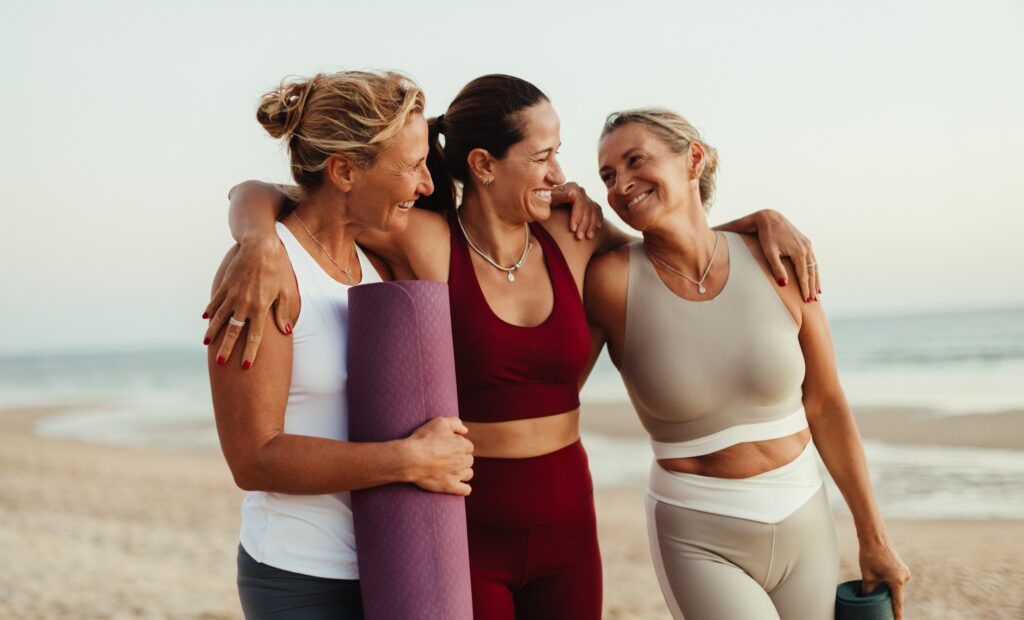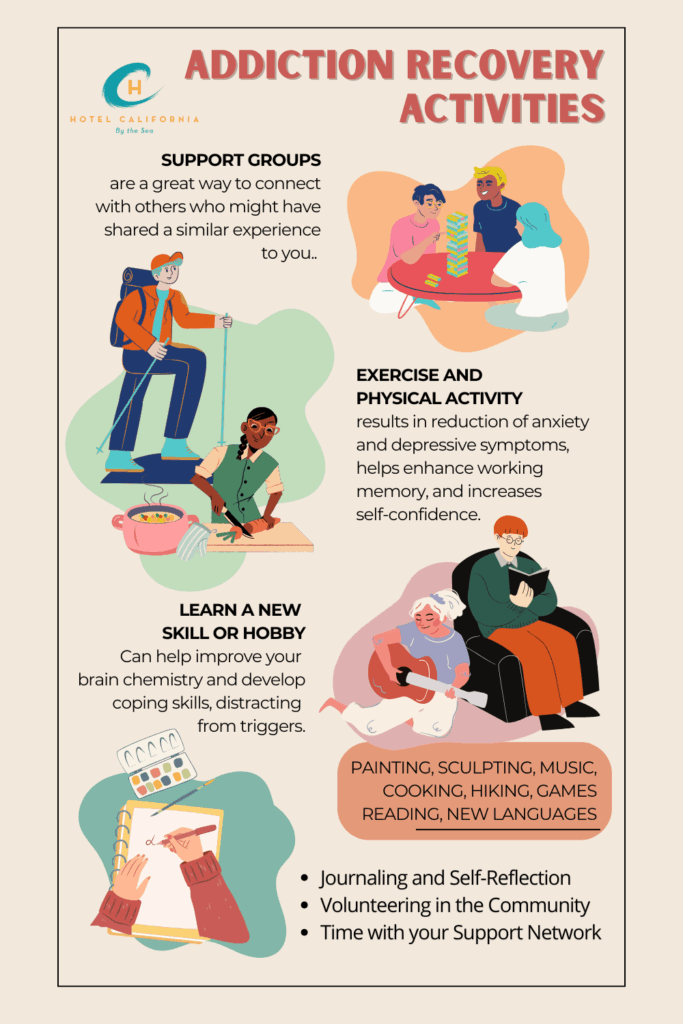Addiction Recovery Activities
Addiction recovery activities can be a super helpful instrument to help achieve and maintain successful sobriety. Substance use disorder is a complex, chronic disease that continues to remain prevalent worldwide. In 2011, an estimated 240 million drug users grew to 296 million in 2021.

Drug addiction impacts the brain’s reward system, motivation and memory circuits. It can lead to biological, psychological, social and spiritual manifestations. It causes distress, escalated use, drug cravings, drug tolerance and ultimately personal and social harm.
During the early stages of recovery, it can be difficult to remain focused on sobriety. Users can go through a rollercoaster of emotions where boredom and free time can become dangerous. Your instincts and intrusive thoughts begin to take over. Transitioning from a lifestyle of drug misuse to complete abstinence from drugs and alcohol is a big change. Part of the recovery process involves creating structure, routine and positive support.
Participating in addiction recovery activities or sober activities can offer users the reward their brains are seeking. It can help prevent relapse. It can help users learn more about themselves. It can lead to better physical and mental health. And it can give users the natural high and euphoria they seek.
Different Types of Addiction Recovery Activities
Support Groups and Group Therapy
Oftentimes, recovery from a substance addiction is seen as a solitary journey with a focus on the individual and their issues. However, addiction impacts the entire community, not just the person with the addiction. Seek out a support group or participate in professional group therapy.
Recovery support groups are a great way to connect with others who might have shared a similar experience to you. It fosters a sense of community among peers and can help improve your mental health when you share and open up to others.
Addiction support groups are also usually peer-led. They are a great way for members to learn from each other and validate each other’s feelings. Members can take comfort in knowing they are not alone in their struggles and recovery journey.
Research has found that group therapy and support group systems can be very impactful in substance addiction recovery. The American Psychological Association found that group therapy activities can be as effective as individual therapy and may even be more efficient when it comes to helping to maintain long-term sobriety.

Exercise and Physical Activity
Exercising and physical activity can play an important role in the recovery treatment of substance and alcohol addiction. Research and studies have found that integrating physical activities results in positive effects in the reduction of anxiety and depressive symptoms, helps enhance working memory, increases self-confidence, elevates well-being and overall quality of life.
Participating in activities like sports can help foster responsibilities, feelings of self-awareness, strengthen self-efficacy and coping skills, and help relationship building and cooperation with others.
Other types of physical activity that are encouraged during the addiction recovery journey are aerobic exercises, strength training, swimming, hiking or walking. Walking is suggested as one of the most popular activities. It is a safe choice for those who are in poor physical condition or have limited motor functions due to the consequences of their substance addiction.
Participating in yoga can help connect the mind with the body. It helps to reduce anger, stress, confusion, fatigue and both physical and mental tension. Tai Chi and Qi gong are traditional Chinese exercises that also result in positive mental and physical effects. It can promote better sleep, suppress feelings of depression and anxiety, and reduce withdrawal symptoms.
Physical activity and exercise can help enhance overall health, fitness and wellbeing. The connection between physical exercise and the integration of life skills can ultimately help reinforce positive attributes to long-term recovery and healing. Aspects of recovery include the therapeutic processes of goal setting, time management, emotional regulation, leadership, problem-solving, and decision-making. All of these can be positively impacted by improved physical health.
Check Your Insurance Coverage for FREE
Find out if your insurance covers addiction treatment in minutes. We accept most insurance!
Learn a new skill or hobby
Learning a new skill or starting a new hobby is a great way to use your energy and distract your mind from old habits. There may be something new that piques your interest. Start a creative project such as painting, sculpting or making music. Sometimes your new hobby doesn’t necessarily require any skills. It just focuses on the act of creating something. This act alone can be liberating. Art can be a great way to nonverbally express yourself. It can be an outlet for those who have trouble expressing feelings and emotions with words.
Your new hobby can also give you a chance to practice your skills in real life. They can be new or old skills. Something like dancing or learning a new language. It can improve your brain chemistry and be a good distraction from cravings or triggers.
Other effective Addiction Recovery Activities
- Cooking. The simple act of cooking and sharing meals with others offers a sense of bonding and a chance to work with others and enjoy the fruits of your labor.
- Journaling. Writing down your emotions on paper in your own words can help you self-reflect and see how you have changed or grown during your recovery journey.
- Games. Playing games can build trust and cooperation with others. It promotes participation, interaction, communication, problem-solving, and teamwork with others.
- Learn more about addiction. Knowledge is power. It can be hard to fight something that you don’t know much about. Learning about the disease can help give you more insight about how it affects you and how your brain works.
- Volunteer. Volunteering and giving back to your community can result in mental wellness. It can make you feel socially connected to others, ease depression, ease loneliness and lower stress.
- Spend time with your support network. Spending time with your friends, family and loved ones enables you to socially connect and rebuild your relationships that might have been damaged during your addiction.
Reach out to Hotel California by the Sea
We specialize in treating addiction and other co-occurring disorders, such as PTSD. Our Admissions specialists are available to walk you through the best options for treating your addiction.
Treatment for Substance Use Disorder
Substance use disorder can be a difficult mental health disorder to overcome. Participating in addiction recovery-based activities can help motivate people to maintain long-term sobriety. Activities such as learning a new hobby, prioritizing self-care and engaging in physical activity can all be great ways to maintain overall physical and mental health. Professional behavioral health treatment programs such as Hotel California by the Sea encourage addiction recovery activities as part of a comprehensive treatment plan.
We offer treatment at all levels of care including detox, residential, PHP and IOP. We utilize evidence-based methods such as CBT, DBT and EMDR therapy. Hotel California by the Sea is dedicated to helping clients achieve their goals of sobriety and successfully overcome their substance addiction.
References:
https://www.addictions.com/blog/36-addiction-recovery-group-activities
https://pmc.ncbi.nlm.nih.gov/articles/PMC11201577
https://newenglandmedicalgroup.com/family-activities-that-support-recovery/
https://www.mentalyc.com/blog/10-fun-substance-abuse-group-activities-for-adults
https://www.recoveryanswers.org/research-post/does-access-fun-activities-support-addiction-recovery-2/
https://www.mentalhealthctr.com/10-sober-activities-for-addiction-recovery/
